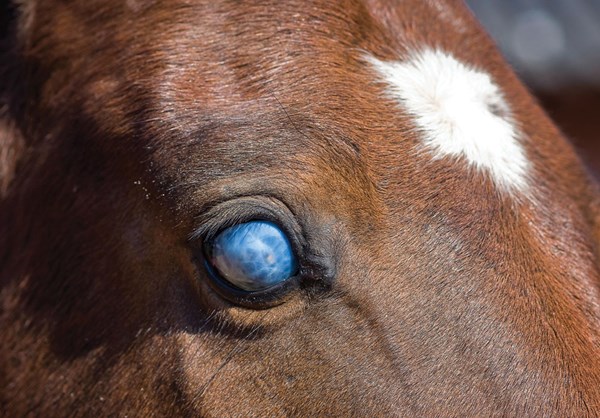 Moon blindness has been linked to leptospirosis, for which there is now a new vaccine. | © Paula da Silva/Arnd.nl
Moon blindness has been linked to leptospirosis, for which there is now a new vaccine. | © Paula da Silva/Arnd.nlA new vaccine can protect horses from leptospirosis, an infectious bacterial disease that has been linked to equine recurrent uveitis (ERU, or moon blindness), late-term abortion in pregnant mares and other serious effects. It’s the first vaccine against this disease licensed specifically for horses.
Bacteria that cause leptospirosis (called leptospires) can infect many animals, including rats, skunks, opossums, raccoons, deer, dogs and cattle, and even humans. Different strains (servovars) of the bacteria seem to affect various animals in different ways. Many healthy horses have been exposed to one or more strains without harm, research suggests. The new vaccine, Lepto EQ Innovator® (Zoetis), targets the servovar L. Pomona, the one most often responsible for serious disease in horses.
Leptospires are shed in the urine of infected animals, and horses can pick them up by drinking water, eating hay or grain or (less often) contacting soil or bedding contaminated with infected animals’ urine. The bacteria pass through mucous membranes and then invade body tissues. The horse may show only vague flulike symptoms. But real trouble comes when the bacteria congregate in specific body tissues. That may lead to kidney or liver failure or, in mares, abortion. Researchers think ERU can be triggered by an immune reaction to leptospires in the eye. In this case, inflammation can recur even after the initial infection is gone, damaging eye tissue and eventually causing blindness. Appaloosas seem at especially high risk for this reaction.
The new vaccine proved safe and effective in trials. Should you add it to your horse’s spring shot list? That’s something to discuss with your horse’s veterinarian. Guidelines from the American Association of Equine Practitioners list this vaccination as “risk-based,” meaning that the need for the shot may differ from one region, farm or horse to another. The need can be difficult to assess so it’s important to check with the vet.
Good management can also reduce the risk of leptospirosis. Don’t let horses drink from stagnant or slow-moving water sources, which may be contaminated by infected wildlife. And make sure that rats and other critters can’t get into your horse’s grain and hay.
This article originally appeared in the April 2016 issue of Practical Horseman.





